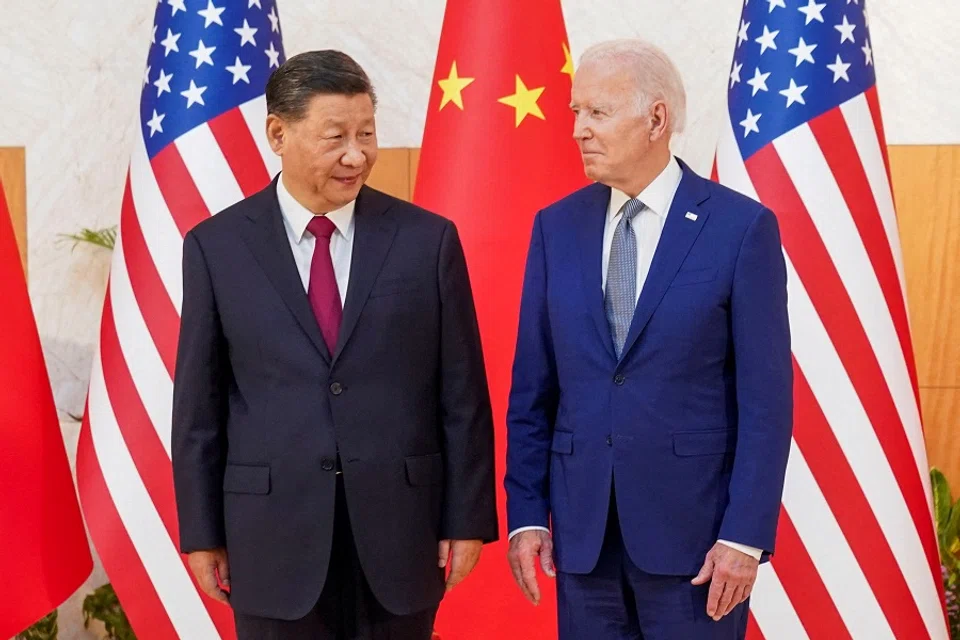Xi-Biden meeting: Nobody wants war over Taiwan Strait
The long-awaited face-to-face meeting between US President Joe Biden and Chinese President Xi Jinping finally took place this week on the sidelines of the G20 summit. While both sides expectedly reiterated their stance on key issues such as climate change, North Korea and the Russia-Ukraine war, the Taiwan issue continues to be the highlight, with Xi marking it as the "first red line'' that must not be crossed. Zaobao journalists Miao Zong-Han and Daryl Lim tell us more.

In their first face-to-face meeting as presidents on 14 November, US President Joe Biden raised objections to "the PRC's coercive and increasingly aggressive actions toward Taiwan", while Chinese President Xi Jinping emphasised that the Taiwan question was "the first red line that must not be crossed in China-US relations".
Academics Zaobao spoke to said it was unsurprising that red lines were drawn, and that this showed the salience of the Taiwan issue in China-US relations.
The first red line
Xi and Biden met for three hours on the sidelines of the G20 summit in Indonesia, where they agreed to work together to address transnational challenges such as climate change, and also asserted their positions on issues concerning the Taiwan Strait, North Korea and Russia-Ukraine war.
The White House stated that with regard to Taiwan, Biden reiterated that the US's "one China policy" has not changed and also opposes "any unilateral changes to the status quo by either side". He raised objections to Beijing's "coercive and increasingly aggressive actions toward Taiwan", which "undermine peace and stability across the Taiwan Strait and in the broader region, and jeopardise global prosperity".

However, when asked after the meeting if Beijing was preparing to attack Taiwan, Biden told reporters that he did not think that there was "any imminent attempt on the part of China to invade Taiwan".
Meanwhile, CCTV News reported that during the meeting, Xi emphasised that the Taiwan issue was "at the very core of China's core interests", "the bedrock of the political foundation of China-US relations", and "the first red line that must not be crossed in China-US relations". In addition, while the Chinese side hoped to see and was always committed to peace and stability across the Taiwan Strait, "cross-strait peace and stability and 'Taiwan independence' are as irreconcilable as water and fire". It further hoped that the US side "will match its words with action and abide by the one-China policy and the three joint communiques".
Xi's call for Biden to abide by the "one China policy" rather than the "one China principle" evidently gives hope for China and the US to recover some flexibility on the Taiwan issue. - Lu Yeh-Chung, Chair of the Department of Diplomacy, National Cheng-chi University
Lack of mutual trust
Xi also said that since Biden had mentioned on numerous occasions that the US does not support "Taiwan independence" and has no intention of leveraging Taiwan as a tool in competition with China or to contain China, he hopes that "the US side will act on this assurance to real effect".

Lu Yeh-Chung, chair of the Department of Diplomacy at National Cheng-chi University (NCCU), noted that Xi's use of strong terms such as "core", "red lines" and "irreconcilable as water and fire" shows the importance China places on the Taiwan issue. However, Xi's call for Biden to abide by the "one China policy" rather than the "one China principle" evidently gives hope for China and the US to recover some flexibility on the Taiwan issue.
Chang Teng-chi, chair of the Department of Political Science at the National Taiwan University, believes that both sides were determined to say their piece on Taiwan, and US policy remains focused on reiterating its objection to changing the situation in the Taiwan Strait, in line with the Taiwan Relations Act, the Three Communiques and Six Assurances.
... there at least has to be a show of sincerity from both parties, particularly on Taiwan, which calls for wisdom and resolve to manage disputes. - Zhu Feng, Executive Director, School of International Studies, Nanjing University

On the lack of mutual trust between China and the US on the Taiwan Strait, Zhu Feng, executive director of the School of International Studies at Nanjing University, said that given the current China-US political climate, it is unlikely that the meeting would result in a breakthrough on Taiwan and other issues, but there at least has to be a show of sincerity from both parties, particularly on Taiwan, which calls for wisdom and resolve to manage disputes.
Objecting the use of nuclear weapons in Ukraine
The statement from the White House following the meeting stated that both leaders "underscored their opposition to the use or threat of use of nuclear weapons in Ukraine". Biden also "raised concerns about the DPRK's provocative behaviour, noted all members of the international community have an interest in encouraging the DPRK to act responsibly, and underscored the United States' ironclad commitment to defending [its] Indo-Pacific Allies".
NCCU's Lu said that given North Korea's frequent missile tests over the past few weeks, the whole world is also watching to see whether Pyongyang would conduct its seventh nuclear test. Biden's current line is to placate its allies such as Japan and South Korea, while signalling to Beijing that it should exert its influence on North Korea.
China and the US do not want war. Both sides will have to ensure that tensions do not escalate and there is no misjudgement. - James Dorsey, Senior Fellow, S. Rajaratnam School of International Studies, Nanyang Technological University

On the significance of the meeting, James Dorsey, senior fellow at the S. Rajaratnam School of International Studies at Nanyang Technological University, noted that China and the US do not want war. Both sides will have to ensure that tensions do not escalate and there is no misjudgement. This meeting between the leaders would ensure proper management of competition so that it does not go out of control. He believes that China and the US will gradually resume dialogue on various levels.
This article was first published in Lianhe Zaobao as "拜登反对咄咄逼人 习近平强调第一条红线不可逾越".





![[Photos] Fact versus fiction: The portrayal of WWII anti-Japanese martyrs in Taiwan](https://cassette.sphdigital.com.sg/image/thinkchina/3494f8bd481870f7c65b881fd21a3fd733f573f23232376e39c532a2c7593cbc)
